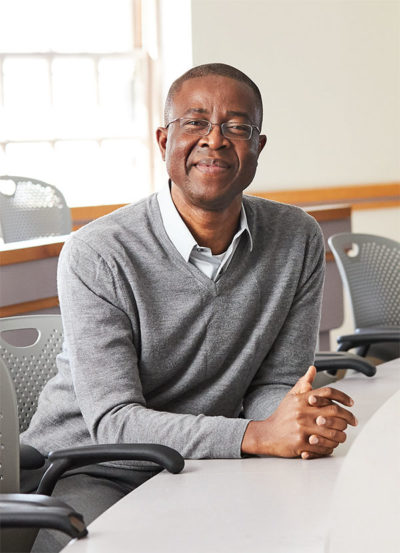
Photo: Pat Piasecki
Vincent Onyemah, associate professor of marketing
Vincent “Vini” Onyemah, associate professor of marketing, was born in Ibadan, Nigeria, and is a member of the Igbo tribe. People in his tribe, he says, believe that their destinies are under their own control. “We are always trying new things,” he says.
In the tradition of his tribe, Onyemah’s personal philosophy is to live life outside of his comfort zone. “Strength comes through misfits,” he says. Not the socially maladjusted kind, but the type of “misfit” in which something seems out of place or illogical. “From the time I was born, my life has been a series of misfits,” Onyemah says. For instance, he was born on the wrong side of the bloodiest civil war in his country’s history—“It was Nigeria against my tribe”—and his family had to go into hiding for several years. Then in elementary school, Onyemah attended a Catholic school in a Muslim neighborhood.
But these challenges have made a huge difference in Onyemah’s life. “You learn about yourself, how to humble yourself,” he says. “You think you know something, but then you meet people, go places, and you say, ‘hey, no.’ It’s helped me to never take anything for granted. It taught me the value of trying to ask the right questions, and to realize that you don’t know what you don’t know.”
Onyemah would feel like a misfit many more times in life. A star soccer player in high school, he wanted to try to become a professional. Onyemah also loved business, which he learned about from working with his mother and father. His mother had a stall in the local market where she sold spices and dried fish. From her, Onyemah learned the art of interacting with people. His father, a secretary in the College of Medicine at the University of Ibadan, was an entrepreneur on the side, selling cleaning supplies. Onyemah would join him on trips to negotiate contracts and then help source and sell the supplies.
But Onyemah didn’t become a professional soccer player or go to college for business. His father, inspired by his co-workers at the College of Medicine, wanted one of his seven children to be a doctor. After winning one of eight full scholarships to college in a national competition, Onyemah seemed the likely candidate. “But I’m scared of the sight of blood,” he says. “I suffer more than the patient just looking at it.” So he bargained with his father. “I told him, I don’t think I would be able to study medicine. But I love math. Ask your friends at the university which subjects have more math, and that’s what I’ll study.” His father came back to Onyemah with an answer: civil engineering.
Although he didn’t enjoy his studies, Onyemah excelled. For a year after graduating, he worked as a civil engineer to complete his required service to his country. Then he had an opportunity to earn a PhD in engineering with a full scholarship to King’s College London. Instead, he decided to follow his passion and study business at the IESE Business School in Barcelona, Spain, receiving a scholarship from a foundation. Onyemah chose IESE because this time he actually wanted to be a misfit. “People would say, ‘You’re crazy, going to Spain,’” he says, because he didn’t know the language or culture. “And I’d say, ‘Yes, I know.’” But he thrived, and he came away with both a degree and fluency in Spanish. Onyemah chose a similar path when earning his PhD. “I wanted to go out of my comfort zone again,” he says, so he went to study at Insead in Fontainebleau, France, earning his degree and becoming fluent in French.
When looking for a teaching position, Onyemah chose Boston for the reputation of its universities and its location. “I had in my mind that I was going to travel, and Boston is not too far from the rest of the the world,” he says. Although he was intrigued by Babson, no positions were open, so he accepted a position at Boston University. About six years later in 2009, he learned of an opening at Babson, applied, and joined the faculty that fall. The smaller, entrepreneurial school fits Onyemah’s personality. “You’re not afraid to think differently, to get out of your comfort zone and make something happen,” he says.
One course that Onyemah helped create is “Sales in Action,” which teaches students how to be persuasive and communicate their value. The course focuses on sales, but the skills it teaches apply to many aspects of life. “When you make a request of any nature, that is selling,” he says. “In today’s world, there’s hardly anything you can do if you don’t have the ability to present a compelling case.”
As a professor, Onyemah continues to push himself out of his comfort zone. Last academic year, he took a sabbatical and moved with his family to Mexico City. Friends and family once again questioned his choice, but his wife and three children were thrilled with the experience. “Now they speak Spanish, they made new friends, and they see Mexico for what it really is,” he says. In Mexico City, Onyemah did research on sales-force management and practices in Latin America, continued work he was doing with the Babson Entrepreneurship Ecosystem Platform, co-authored an article for the Harvard Business Review, and finished the book he co-authored, Entrepreneurial Selling.
Onyemah never plans to stop being a misfit. Over the course of his career, which also includes working with the International Finance Corp. and consulting, he has lived in five countries for at least a year and has been to more than 20. “Now I go to many parts of the world, where people think I’m a misfit, and I’m still able to serve and make an impact and relate with the people,” he says. “It’s helped me to never take anything for granted.”
